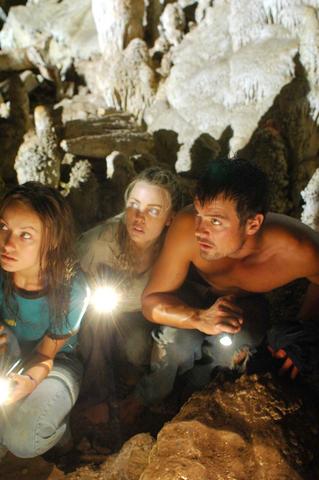If stupidity were a crime, the nitwits in the cheap horror flick Turistas would be doing time in Attica. A grubby, lethally dull bid to cash in on the new extreme horror, the film turns on a conceit as frayed as Freddy Krueger's shtick: a group of hotties stumble into the lair of a madman. Carnage ensues. Here the hapless, clueless and braless are the English-speaking tourists of the film's title who, having gone abroad to party hearty, end up being batted about by a wacky cat with very sharp claws and a seriously sick sense of social justice.
Although his heart clearly isn't in the more unsavory aspects of the job, namely slicing and dicing, the director, John Stockwell, does make a faint, early effort to infuse the proceedings with a smidgen of humor. The opening scene of a Brazilian bus careering wildly on a twisty rural road while the sweaty, swarthy bus driver rummages inside his nostrils (and wrestles a shift stick adorned with a pentagram), does manage to squeeze some dubious humor from the image of the freaked-out white tourist. The only problem is that in this case those fears turn out to be entirely justified, since it isn't long before the bus is sliding down a mountain, taking that initial flicker of amused reflexivity with it.
What follows is the old splatter and scream as the interchangeable pretty girls and hard-body boys are lined up like ducks to be shot down or, in the case of one turista, gutted while still conscious. (The actors playing the ducks are similarly interchangeable; you can find their names in the accompanying credit box.) This operation, which isn't any more disgusting than the medical surgeries that crop up on television - though it's considerably less well-lighted - is as laughable as it is repulsive. That's especially true when the evil doctor, Zamora (Miguel Lunardi, eyeballs popping), places one victim's internal organs next to her fetching naked breast, a gesture that neatly encapsulates the sexual panic and misogyny that characterize the stupidest examples of extreme horror.

Apologists for vivisectionist entertainment trot out all sorts of rationales to justify the spectacle of human torture instead of just admitting that such spectacles turn them on. In this respect the horror audience, in its enthusiasm for go-go gore, is far more honest than those who hide behind the fig leaf of radical politics. Like Hostel (a critique of American arrogance, don'tcha know), which seems the most direct inspiration for Turistas, this film involves first-world tourists who are violently punished for traveling into a third-world (or third-world-like) country. Turistas plays this political angle more openly than does Hostel, since Zamora defends his blood lust by donating gringo organs to his country's poor. Yeah, yeah, yeah, and Jason and Freddy donate regularly to their local blood banks.
Advancements in special effects have made it easier than ever to make fictional disembowelments and the like look super-realistic. And on a funda-mental level, the charnel-house aesthetics of films like Hostel, Cabin Fever and the remake of The Texas Chain Saw Massacre are not any different from the graphic passages in films like Saving Private Ryan and Flags of Our Fathers. The goals of these war movies are certainly far loftier than those of a run-of-the-mill horror divertissement, but in the end they all traffic - in part or in whole - in convincing images of extreme human suffering. Some films do it for art; others for amusement. For better and at times for worse, though, the cinema of death now appears inescapable.

PHOTO: COURTESY OF GROUP POWER

May 18 to May 24 Pastor Yang Hsu’s (楊煦) congregation was shocked upon seeing the land he chose to build his orphanage. It was surrounded by mountains on three sides, and the only way to access it was to cross a river by foot. The soil was poor due to runoff, and large rocks strewn across the plot prevented much from growing. In addition, there was no running water or electricity. But it was all Yang could afford. He and his Indigenous Atayal wife Lin Feng-ying (林鳳英) had already been caring for 24 orphans in their home, and they were in

President William Lai (賴清德) yesterday delivered an address marking the first anniversary of his presidency. In the speech, Lai affirmed Taiwan’s global role in technology, trade and security. He announced economic and national security initiatives, and emphasized democratic values and cross-party cooperation. The following is the full text of his speech: Yesterday, outside of Beida Elementary School in New Taipei City’s Sanxia District (三峽), there was a major traffic accident that, sadly, claimed several lives and resulted in multiple injuries. The Executive Yuan immediately formed a task force, and last night I personally visited the victims in hospital. Central government agencies and the

Australia’s ABC last week published a piece on the recall campaign. The article emphasized the divisions in Taiwanese society and blamed the recall for worsening them. It quotes a supporter of the Taiwan People’s Party (TPP) as saying “I’m 43 years old, born and raised here, and I’ve never seen the country this divided in my entire life.” Apparently, as an adult, she slept through the post-election violence in 2000 and 2004 by the Chinese Nationalist Party (KMT), the veiled coup threats by the military when Chen Shui-bian (陳水扁) became president, the 2006 Red Shirt protests against him ginned up by

As with most of northern Thailand’s Chinese Nationalist Party (KMT) settlements, the village of Arunothai was only given a Thai name once the Thai government began in the 1970s to assert control over the border region and initiate a decades-long process of political integration. The village’s original name, bestowed by its Yunnanese founders when they first settled the valley in the late 1960s, was a Chinese name, Dagudi (大谷地), which literally translates as “a place for threshing rice.” At that time, these village founders did not know how permanent their settlement would be. Most of Arunothai’s first generation were soldiers